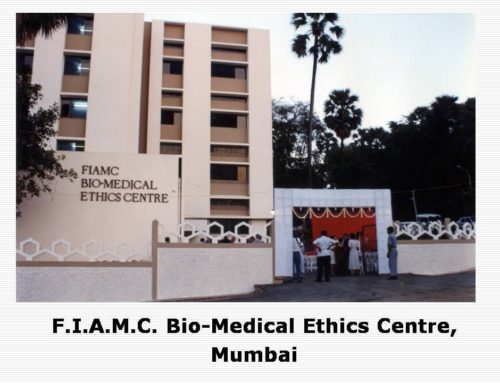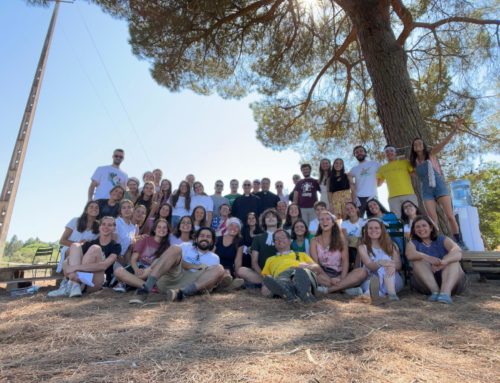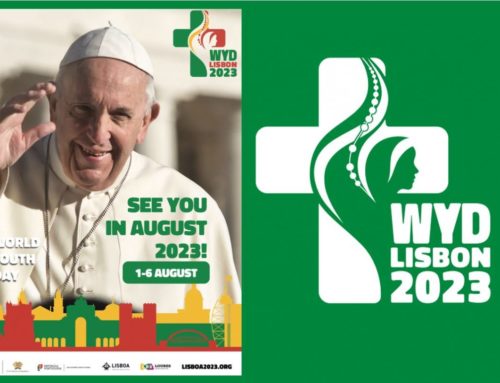Linacre Q. February, 2015; 82(1): 13–17.
Integrating Faith and Life as a Catholic Physician
I had an interesting experience in talking to a young Catholic doctor who is undergoing residency training at the moment. His struggle is that he is working so hard and feels tired. He also can make no connection between his faith and his life as a busy intern. When I asked him, he was unable to explain any aspects of his work that would connect to his faith and worship—as if the Holy mass on Sunday was one thing and the work on Monday was totally unconnected.
I have observed this in various dialogues with various Catholic doctors and doctors-to-be (medical students)—many of them find it hard to integrate their faith and their work. I am reminded of the words of Gaudium et spes regarding those
who think that religion consists in acts of worship alone and in the discharge of certain moral obligations, and who imagine they can plunge themselves into earthly affairs in such a way as to imply that these are altogether divorced from the religious life. This split between the faith which many profess and their daily lives deserves to be counted among the more serious errors of our age. (Vatican Council II 1965, n. 43)
Rather than denounce their “serious error” I see it more of a motivation to be dedicated to their evangelization. To help the at-times overworked doctor to really value his or her own efforts, to grasp that our Lord himself values their long hours, hard work, and sacrifice, and that their self-giving is a real path to holiness and Christification.Go to:
Jesus as the Good Doctor
It is a pity and slightly ironic that a Catholic doctor has difficulty to identify or live an effective spirituality in their work place considering that in the tradition of the Church, Jesus is recognized as the “Divine Physician” and “Good Doctor” as in the letter of St. Ignatius of Antioch to the Church of Ephesus. St. Augustine cries “O my inner Physician” (Confessions, Bk 10, Ch. 3) and “Woe is me! Behold, I do not hide my wounds. Thou art the Physician, I am the sick man” (Confessions, Bk 10, Ch. 28). Jesus exercised the ministry of healing, and the gospels are littered with examples of him curing the sick. We need only remember the cure of the servant of the centurion among many others
The centurion said in reply, “Lord, I am not worthy to have you enter under my roof; only say the word and my servant will be healed” … And Jesus said to the centurion, “You may go; as you have believed, let it be done for you.” And at that very hour his servant was healed. (Matt 8:8.13)
Jesus was a healer and even said “Those who are well do not need a physician, but the sick do” (Matt 9:12). But the medicine of Jesus was not paracetamol but the mercy of God. So Jesus is the Good Doctor—surely it should not be too difficult for a Catholic doctor to develop an authentic spirituality in and from his or her work as a physician?Go to:
Jesus as the Patient
A Catholic doctor is further assisted in living his/her faith in the hospital when he/she comes to the awareness that not only is Christ the Good Doctor, but he is also present in the patient. How can we understand this? The words of Jesus help us in the twenty-fifth chapter of Matthew’s Gospel when the Son of Man said he was “ill and you cared for me” (Matt 25:36). The unsuspecting medics could not remember this moment so they ask “when did we see you ill?” A few verses later (in Matt 25:40) we have the clear answer “And the king will say to them in reply, ‘Amen, I say to you, whatever you did for one of these least brothers of mine, you did for me.’”1
Knowing this, I always encourage doctors in their work telling them that they have the great privilege in their work of treating the sick, and when they touch the sick person they are touching Christ himself. In a more mystical way they can also recall the words in the institution of the Eucharist “This is my Body.” Those words are true not only in the Mass on Sunday but also in the operating theatre or clinic on Monday.
I think as doctors we can touch the body of the patient in a different way, not just feeling for abdominal tenderness, but conscious that we are touching the body of Christ. I remember the email of a medical student from Venezuela. She is a lay member of our community and she shared how she had been involved in the treatment of a bank robber with many gunshot wounds, in Caracas. At first she just saw the wounds and the blood loss, but she became aware in one moment that these wounds also belong to the wounded Christ of today.Go to:
Contemplatives in Action!
How do we find meaning in what we are doing as Catholic doctors? It is by finding Christ in what we are doing. Sometimes this is hard as we forget to pray! Busy doctors also need to be contemplatives in action. They are not called to spend their whole day in the convent or monastery, although at times they might enjoy the break, but they are called to be contemplatives in action. In his recent apostolic exhortation, Pope Francis said
The problem is not always an excess of activity, but rather activity undertaken badly, without adequate motivation, without a spirituality which would permeate it and make it pleasurable. As a result, work becomes more tiring than necessary, even leading at times to illness. Far from a content and happy tiredness, this is a tense, burdensome, dissatisfying and, in the end, unbearable fatigue. (Francis 2013, n. 82)
Later he states the remedy
What is needed is the ability to cultivate an interior space which can give a Christian meaning to commitment and activity. Without prolonged moments of adoration, of prayerful encounter with the word, of sincere conversation with the Lord, our work easily becomes meaningless; we lose energy as a result of weariness and difficulties, and our fervour dies out. The Church urgently needs the deep breath of prayer. (Francis 2013, n. 262)
We often ask our patients to take a deep breath but we need to be the first ones to take a deep breath of prayer before our work, otherwise if we are not inspired by what we are doing our enthusiasm will soon expire! We can be doing many things but it can even become tasteless.Go to:
Without Prayer Our Work Becomes Tasteless
I remember once being assigned to cook dinner for my fellow missionaries. I decided to make a tasty soup. I found some chicken, some leftover vegetables and flung all the ingredients into a big pot and decided to call it “Scottish soup.” It was lacking salt and so, after adding some, still it did not taste right, so I poured in the rest of the bag. Serving the soup the others commented that it was great but it lacked salt. I protested that I had put in half a bag. This caused some confusion as one brother in charge of the kitchen supplies said that actually we had no salt in the house. I checked the bag and it was not salt but Ajinomoto, a type of MSG food additive. When there is no salt all is tasteless! “You are the salt of the earth, but if salt loses its saltiness…” (see Matt 5:13). I think the salt in our Christian lives is prayer, downtime, or moments of reflection.Go to:
Was It 154 Stitches?
I am sharing these things to you in hindsight really. When I was working full time as a doctor I never really prayed. I was not as holy as I am now! I studied medicine at Cambridge University in England. At the end of my first year, my supervisor wrote in his report “This boy knows absolutely no anatomy whatsoever. However his ambition to be a surgeon should be taken seriously.” Seven years later I was a doctor, teaching anatomy at Edinburgh University preparing for my fellowship in surgery which I passed. The Lord called me when I was doing my specialization in plastic surgery. How is it possible, the passage from plastics to priesthood? Simple! At first I understood my call as a surgeon “Reconstruct my people,” and so I did that. But I also began to reflect on my experiences, at least some of them. Not quite a contemplative in action but on the way. One Saturday night we treated a drunk man who had been fighting with his neighbor. He had been struck on the head by a beer bottle and required surgery to his multiple scalp lacerations. At 3 am, I was assisting and also tasked with counting the sutures for our subsequent police report. A sudden drowsiness came over me, and I had to ask my boss “Was it 153 or 154 stitches?” A few days later the beautiful wife of the patient entered the ward. She seemed very attractive until she found out the story. She turned to me in her fury. “Just wait until next Saturday! That neighbor of ours is going to need more than 300 stitches!” “Oh dear,” I thought “more work for us!”Go to:
Reconstruct My People
I was struck by something. I had fixed the face (and scalp) of our drunken brawler but who was going to fix that face of hatred of the wife? That hatred and ugliness was the cause of the violence. How to fix that? The dim light of a calling dawned on me—to reconstruct the face of Christ in this person. To dedicate to reconstruction, to pass from a fisherman to a fisher of men, to pass from a reconstructive surgeon to reconstruct the people of God! It was not a change but rather a deepening of the calling I had always felt. To reconstruct the face of Christ in the world in the lives of many. I say it is not really a change although of course a slight change in the salary from a plastic surgeon in training to a priest with a vow of poverty. That is why I am always happy to take donations!
The mission of the Church then is the great project of the Holy Spirit to reconstruct and renew the face of the earth. That is why every Pentecost when we pray “Come Holy Spirit and renew the face of the earth” I always add quietly under my breath “and renew this face as well.”Go to:
Intellectual Formation
Coupled with spiritual formation is the intellectual formation of the Catholic physician. Most doctors today are very well prepared and for this we had to sit many exams, reviews, board exams, etc. But how about our Catholic formation? Sometimes we can be medically updated, but in the medical world of today are we updated with all its ethical challenges?Go to:
Key “Catholic” Areas
I think there are some key issues which every Catholic physician should be well versed in, updated, and able to explain:
- 1. To be aware of the medical/psychological/sociological consequences of abortion;
- 2. To be able to explain why in vitro fertilization is wrong;
- 3. To know the medical and moral pitfalls of contraception;
- 4. To be able to promote natural family planning;
- 5. To be updated on the soaring HIV rates worldwide in MSM (men who have sex with men) and the dangers of an active homosexual lifestyle;
- 6. To advise against physician-assisted suicide and euthanasia;
- 7. To beware of receiving luxurious gifts from pharmaceutical companies;
- 8. To have more concern for the health care of the poor;
- 9. To recognize the victims of human trafficking and prostitution when we see them in the emergency room or in our practices.
Doctors Can Have a Powerful Voice
Many in society still respect the opinion of the physician. One example from overseas is the role of doctors in campaigning to reduce alcohol consumption in Scotland, for example by lobbying to reduce sponsorship of sporting events by alcoholic brands.
In Scotland, on one day (Grant 2011, 2):
- • Alcohol will cost Scotland £97.5 million in terms of health, violence, and crime;
- • Alcohol will kill five people;
- • 98 people will be admitted to hospital with an alcohol-related condition;
- • 23 people will commit a drunk driving offence;
- • 450 victims of violent crime will perceive their assailant to be under the influence of alcohol.
What Can Be Done? Something!
The doctors in Scotland worked on areas such as pricing of alcohol, information and education, labeling of alcohol products, and early intervention and treatment of alcohol misuse.Go to:
We Cannot Just Keep Quiet
I was shocked to read the latest news regarding the Australian euthanasia advocate Dr. Philip Nitschke. He was suspended from the medical register for helping a forty-five-year-old man to die. What surprised me was the resilence of Dr. Nitschke to continue his deathly ministry! Even when told he would be suspended, he said “It will make no difference to what I do.” While he is shouting to the world and hastening the death of many, we as physicians for life cannot remain silent! As the pastor and theologian Dietrich Bonhoeffer also noted
Silence in the face of evil is itself evil: God will not hold us guiltless. Not to speak is to speak. Not to act is to act.
Each one of us should do our part.
As St. Paul exhorts Timothy and each one of us,
Proclaim the word; be persistent whether it is convenient or inconvenient; convince, reprimand, encourage through all patience and teaching. For the time will come when people will not tolerate sound doctrine but, following their own desires and insatiable curiosity, will accumulate teachers and will stop listening to the truth and will be diverted to myths. But you, be self-possessed in all circumstances; put up with hardship; perform the work of an evangelist; fulfill your ministry. (2 Tim 4:2–5, NAB)
I continue to pray for the good formation, both spiritual and intellectual, not just of physicians but Catholic physicians.Go to:
Biography
Fr. James McTavish, F.M.V.D., M.D., is a Scottish missionary priest with the Fraternidad Misionera Verbum Dei. He originally studied medicine at Cambridge University, later gaining his fellowship in surgery from the Royal College of Surgeons of Edinburgh, before specializing in plastics and reconstruction. He then heard the call of the Lord to heal the wounded Body of Christ through evangelization—“Give me life by your Word” (Ps 119). Having studied moral theology and bioethics in Rome, after priestly ordination he was then assigned to Manila in formation work, biblical apostolate, and teaching morality and ethics in various medical and theological schools.
Correspondence to: Fr. James McTavish, email ku.oc.oohay@dvmfhsivatcmsemaj.Go to:
Endnote
1In these words recent bioethics documents of the Magisterium also see the human embryo included, being truly the smallest and least amongst men. See CDF (2008, n. 37), also John Paul II (1995, n. 104) and CDF (1987, Conclusion).Go to:
References
- Congregation for the Doctrine of the Faith (CDF). 1987. Donum vitae.
- Congregation for the Doctrine of the Faith (CDF). 2008. Dignitas personae.
- Francis Pope. 2013. Evangelii gaudium.
- Grant, Gail. 2011. BMA Scotland Briefing: “One Day” alcohol campaign Edinburgh, Scotland: BMA Scotland. [Google Scholar]
- John Paul Pope., II 1995. Evangelium vitae.
- Vatican Council II. 1965. Gaudium et spes.
Articles from The Linacre Quarterly are provided here courtesy of SAGE Publications










